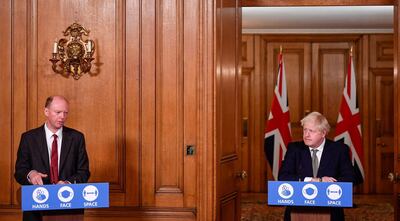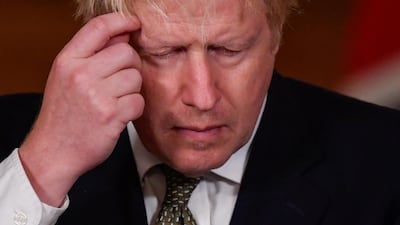British Prime Minister Boris Johnson overruled his own scientific advisers who called for a national “circuit-breaker” lockdown to halt the spread of coronavirus.
And England's chief medical officer, Prof Chris Whitty, cast doubt on whether the government's three-tier lockdown alert system would be enough to suppress the second wave sweeping through large areas of the country.
The scientific advisory group had recommended in a paper that Britain go into an immediate two or three-week lockdown.
Other options in a September 21 paper included more working from home, bans on contact with other households and the closure of all bars and restaurants.
“Not acting now to reduce cases will result in a very large epidemic, with catastrophic consequences in terms of direct Covid-19-related deaths and the ability of the health service to meet needs,” the paper said.
Prof Whitty, speaking alongside Mr Johnson at Downing Street on Tuesday, said he was not confident that the latest restrictions “would be enough to get on top of” the virus without further measures.
“It is the case we are going to have to do more; probably in some areas significantly more," he said.
“The idea that we can do this without causing harm is an illusion. It is a balancing act between two harms: a harm for society and the economy on the one hand and a harm for health on the other hand.”
Communities Secretary Robert Jenrick said that the government might need to impose tighter restrictions in high-risk areas than those announced on Monday.
“The message that we did deliver to those leaders in Merseyside was that we need to take these steps – we probably even need to go further – but that we want to design those steps jointly between ourselves and local government," Mr Jenrick told Sky News.
Defending Mr Johnson’s decision not to impose the scientist-backed circuit-breaking lockdown, he said: “The scientists advise and the prime minister has to make the difficult judgments.”
But Sage scientist Prof Dame Anne Johnson said the UK could have been successful if it acted sooner with tougher restrictions.

“Clearly, the earlier you act in suppressing infection, the greater the impact,” Prof Johnson told BBC’s Radio 4.
She said the UK also failed to “emphasise” social-distancing measures over the summer when infection rates were low.
“Many of the measures on social distancing were still in place but we didn’t go on emphasising them in order to suppress the virus,” Prof Johnson said.
“Public communication is incredibly important in taking the country with you.”
The latest version of the UK virus strategy shows again the perils Mr Johnson faces in balancing the protection of public health and preservation of jobs.
For now, the toughest measures will be brought into force from Wednesday in Liverpool, which has a “very high” alert level. Bars will only be able to open if they serve “substantial” meals.
“I take no pleasure whatsoever in placing restrictions on these businesses,” Mr Johnson said. “But we must act to save lives.”
Households in the Liverpool region will also be banned from mixing indoors and in private gardens. Gyms and casinos will also close.
Mr Johnson said he wanted similar restrictions to apply in Manchester, where cases are also soaring, but indicated local leaders had not yet agreed.
He did not mention new restrictions in London, but there are reports the capital could be moved to “high” alert in coming weeks.
Mr Johnson immediately ran into criticism on his own side, including from Andy Street, the usually loyal Mayor of the West Midlands, who said he was “very disappointed” his region was considered on “high” alert.
“This is not something regional leaders supported, nor what I believed would be happening following extensive conversations over recent days,” Mr Street said.
Other Conservatives raised doubts and objections to Mr Johnson’s strategy in Parliament.
Labour leader Sir Keir Starmer said the system of local lockdowns has not worked so far and clashed with the prime minister over the “serial failure” of the test-and-trace system.
“I’m now deeply sceptical the government has actually got a plan to control of this virus,” Mr Starmer said.
Earlier, senior medical officials painted a grim picture of the resurgent outbreak, with rising cases, hospital admissions and deaths, especially in northern England.
Three Nightingale overflow hospitals are on standby to cope with an expected surge in admissions.
In Europe, other nations are preparing more steps to contain the virus.
German Chancellor Angela Merkel hosted a Cabinet-level meeting on the issue, while Italian Prime Minister Giuseppe Conte is expected to order restrictions targeting nightlife, social events and amateur sports.
The Czech Republic tightened social distancing rules and closed down schools, restaurants and bars to stem the EU’s fastest surge in the pandemic.









